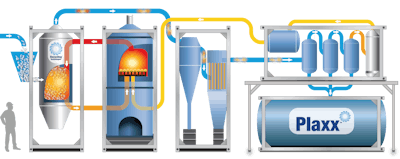
There’s no shortage of research teams and wiz kids at startups looking to tackle the earth’s plastic problem — either by cleaning up existing pollution or finding a way to mass produce a bio-based alternative.
Now one entrepreneur in the UK believes he has come up with a way to not only clean up plastic, but make millions doing it.
According to a report in Bloomberg, Adrian Griffiths said his company, Recycling Technologies (RT), could “change the history of plastic in the world.”
What makes RT unique is that it makes the process of plastic recycling more simple and turns the waste into a valuable products.
To pull this off, RT’s team designed a machine about the size of a tennis court that acts as a refinery and uses a process similar to thermal cracking. Called the RT700, the machine takes in all kinds of plastic waste, thoroughly cleans it and then heats it to 932 degrees Fahrenheit. The heat breaks down the long hydrocarbons in the plastic, allowing the machine to produce different kinds of oil products.
 Image: Recycling Technologies
Image: Recycling TechnologiesAll of the oil the RT700 manufactures is called Plaxx, but there are three varieties. One is a light, yellow oil used by petrochemical companies, another is a thick, brown wax that could be used to make shoe polishes or cosmetics, and the third is a heavier oil that’s like candle wax.
Each machine requires a significant investment. An RT700 costs about $3.8 million to install and $647,000 to operate each year. But Griffiths says that investors should recoup costs within two and a half years. After that, operators will start to reap the rewards. Griffith estimates that each machine, which can process at least 7,000 tons of plastic annually, will generate $2.2 million in revenue per year.
At the moment, only about 10 percent of plastic gets reprocessed because it’s generally cheaper to just make more plastic using petroleum. Of course, this means that plastic is continuing to pile up around the globe. One study estimated that there will be more plastic than fish in the ocean by 2050.
A representative from PlasticsEurope, a trade organization that represents more than 100 companies including BASF and Dow Chemical, said that the RT700 could be a “game-changer.”
So far, RT operates one pilot machine. Griffith hopes to have 100 RT700s online by 2025.






















